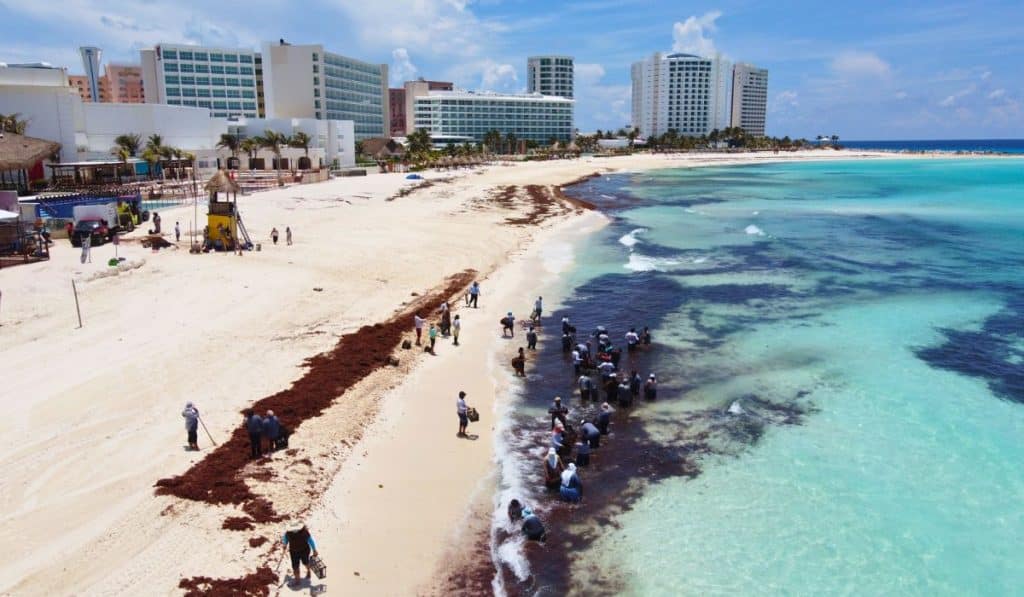Mexican Hotel Association Refuses To Keep Paying For Sargassum Cleaning
2 min readThe Riviera Maya Hotel Association can no longer bear the financial responsibility of cleaning up sargassum each season, says a spokesperson. The presence of macroalgae in the Sargasso Sea has been reported for over five centuries now, but it only started to massively wash ashore on Caribbean beaches since 2011. Scientists estimate this phenomenon is occurring due to rising ocean temperatures and overnutrified waters coming from the large-scale agricultural industry in countries like Brazil and the United States. Technically, sargassum […]
The post Mexican Hotel Association Refuses To Keep Paying For Sargassum Cleaning appeared first on Traveling Lifestyle.
The Riviera Maya Hotel Association can no longer bear the financial responsibility of cleaning up sargassum each season, says a spokesperson.
The presence of macroalgae in the Sargasso Sea has been reported for over five centuries now, but it only started to massively wash ashore on Caribbean beaches since 2011.
Scientists estimate this phenomenon is occurring due to rising ocean temperatures and overnutrified waters coming from the large-scale agricultural industry in countries like Brazil and the United States.
Technically, sargassum arrives in so-called federal zones so hotels in the Mexican Caribbean shouldn’t have to pay for its collection and disposal.
Each algae season, the government and hotel leaders join forces to keep beaches tidy by hiring hundreds of local cleaners and using ocean barriers and “sargassum vessels.”
But, seeing their revenues affected, hotels want to pass this problem to the government, as it should legally be, hoteliers say.
“I’ve been saying this for over three years now. We, the hotel sector, cannot continue paying for [sargassum] collection out of our own pockets. We can’t continue paying for this problem,” said Tony Chaves, head of the Riviera Maya Hotel Association.
“We are talking about 120 million dollars. It’s like two billion pesos a year, that is just unaffordable.”
Decomposing sargassum creates non-Instagram-worthy beaches and releases unpleasant smells that discourage tourists from visiting. Consequently, hoteliers and local economies see their profits impacted.
Back in 2021, BBVA warned the federal, state and local governments, as well as the Mexican private sector and the “Great Caribbean,” about the need to “have plans, actions, and resources prepared” to face the unavoidable sargassum problem.
Three years later, institutions have just begun to pay real attention to a phenomenon that’s not going anywhere.
From July 18-19, the country held the “Mexico-European Union National Forum 2024,” which was intended to find disruptive strategies to turn sargassum into business opportunities and mitigate its arrival on Caribbean shores.
Some organizers included EU representatives, the Secretariat of Ecology and Environment (SEMA), the CAF-Development Bank of Latin America and the Caribbean, and the organization The Seas We Love.
For its part, the IDB Group, together with other agencies, is ready to provide “entrepreneurs, start-ups, corporations, academic institutions and non-profit organizations” with up to $500,000 in funding for business proposals that can effectively mitigate the sargassum issue and generate revenue out of it.
Regarding these initiatives, Chaves commented: “[Participants] should be given easy access to do all of this. We should avoid putting obstacles in the way of the initiatives that can fix this massive problem we have in the Mexican Caribbean now. We are calling on authorities to help streamline these kinds of projects.”




